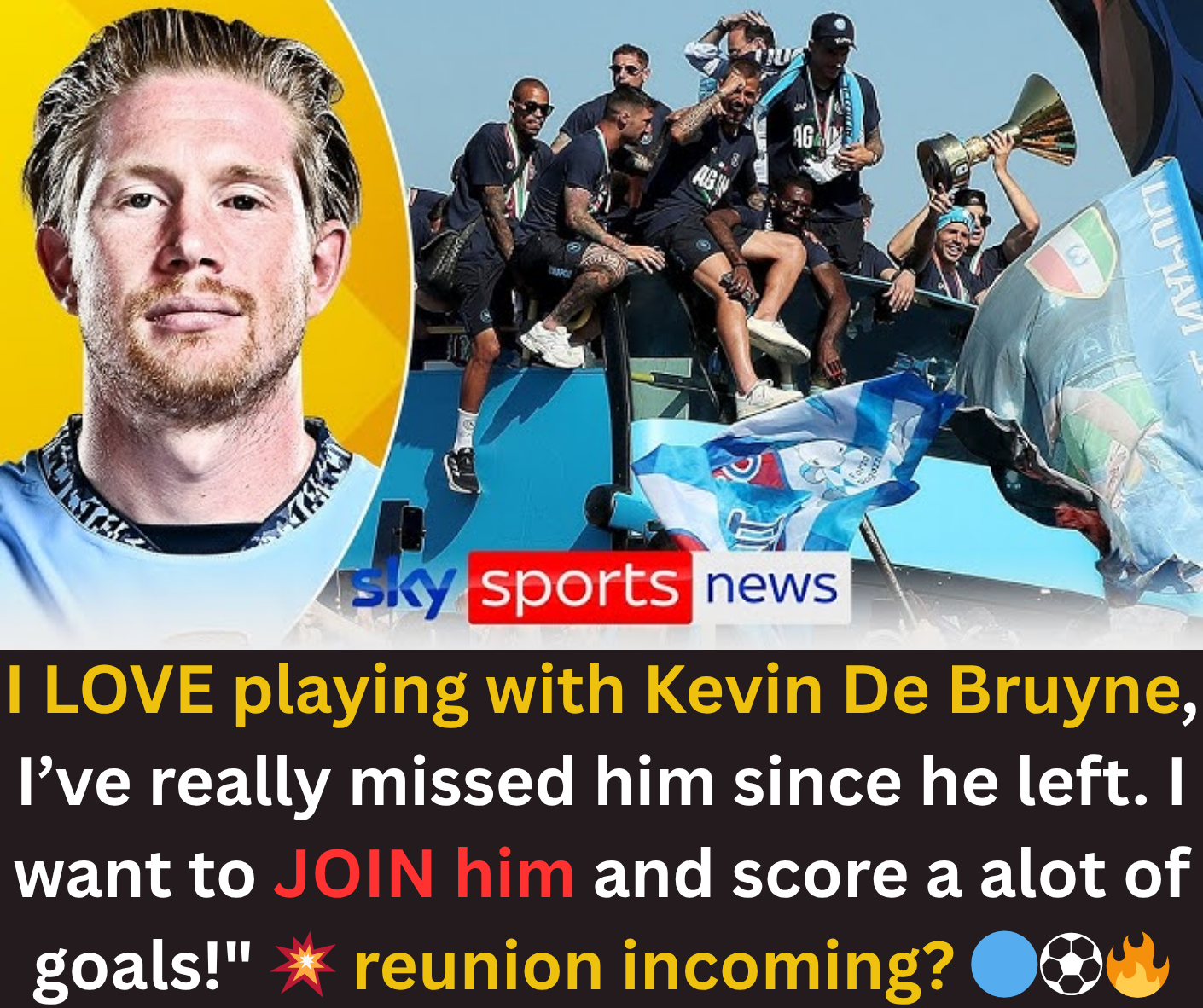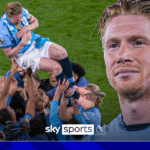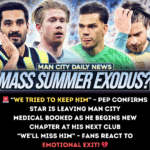Kevin De Bruyne Wants Napoli To Sign 29-Year-Old Manchester City Player: Should The Sky Blues Sell Him?

Manchester City finds itself at a pivotal juncture in its illustrious recent history. The departure of Kevin De Bruyne, arguably one of the most influential players in the club’s modern era, has sent ripples through the footballing world and left the Sky Blues grappling with questions about their future direction. The Belgian maestro, who had become synonymous with City’s success over the past several years, departed as a free agent after the club’s hierarchy made the difficult decision not to extend his contract.
This decision, while pragmatic from a business perspective, marks the end of an extraordinary chapter in Manchester City’s story. De Bruyne’s contribution to the club’s success cannot be overstated – his vision, passing ability, and leadership qualities were instrumental in securing six Premier League titles, cementing City’s position as the dominant force in English football. However, the harsh reality of modern football is that even legends must eventually make way for the next generation, and City’s board has clearly decided that the time has come to look toward the future.
The circumstances surrounding De Bruyne’s departure are particularly poignant. Once considered virtually irreplaceable, the Belgian’s influence had waned in recent seasons due to a series of persistent injuries that limited his availability and effectiveness. While his technical ability remained largely intact, his physical limitations had become increasingly apparent, forcing City to consider whether maintaining such a high-profile player on their books was sustainable given his reduced impact on the pitch.
The Grealish Dilemma: A Player at the Crossroads
With De Bruyne’s departure confirmed, attention has now shifted to another high-profile player whose future at the Etihad remains uncertain: Jack Grealish. The 29-year-old English winger, who arrived at Manchester City with considerable fanfare and expectations, has found himself at the center of transfer speculation that could reshape both his career and City’s tactical approach for the coming seasons.
Grealish’s journey at Manchester City has been a tale of unfulfilled potential and sporadic brilliance. Despite his undeniable technical ability and the substantial investment the club made in acquiring his services from Aston Villa, the English international has struggled to establish himself as an indispensable member of Pep Guardiola’s squad. The 2024/25 season proved particularly challenging for Grealish, as he found consistent playing time elusive due to a combination of tactical decisions by the coaching staff and unfortunate injury setbacks.
The situation has become even more intriguing with reports suggesting that De Bruyne himself is actively advocating for Grealish’s potential move to Napoli. According to sources close to the situation, the departed Belgian has been in communication with Antonio Conte, the Italian club’s ambitious new manager, providing glowing references about Grealish’s abilities and potential fit within Napoli’s tactical system.
Conte’s Vision and Napoli’s Ambitions
Antonio Conte’s arrival at Napoli has generated significant excitement among the club’s supporters and the broader football community. Known for his tactical acumen and ability to maximize the potential of his players, Conte has wasted no time in identifying targets who could help transform Napoli into genuine contenders both domestically and in European competition.
The Italian manager’s interest in Grealish is not merely opportunistic but appears to be part of a broader strategic vision for how he wants his team to play. Conte has reportedly reached out directly to De Bruyne, seeking insight into Grealish’s character, work ethic, and technical capabilities. The positive feedback from the Belgian has only strengthened Napoli’s resolve to pursue the English winger.
From Napoli’s perspective, Grealish represents an opportunity to add a player of proven Premier League quality to their ranks. Despite his inconsistent form at Manchester City, Grealish’s ability to create chances, drive forward with the ball, and provide the kind of unpredictability that can unlock stubborn defenses remains evident. For a Napoli side looking to re-establish itself among Europe’s elite, acquiring a player of Grealish’s caliber could provide the creative spark needed to elevate their performances.
The financial aspect of the potential deal also appears favorable for Napoli. With Grealish’s stock somewhat diminished due to his limited impact at City, the Italian club may be able to secure his services at a price that represents excellent value for money. This is particularly important for Napoli, who, despite their ambitions, must operate within financial constraints that prevent them from competing with the Premier League’s biggest spenders.
Manchester City’s Strategic Considerations
For Manchester City, the decision regarding Grealish’s future is far from straightforward and involves multiple layers of strategic consideration. The club’s leadership must weigh the immediate financial benefits of a potential sale against the long-term tactical implications of losing a player with Grealish’s unique skill set.
From a purely economic standpoint, selling Grealish would provide City with substantial funds that could be reinvested in the squad. The club’s commitment to Financial Fair Play regulations means that generating revenue through player sales remains an important consideration, and Grealish’s departure would create significant room in both the transfer budget and wage structure for new acquisitions.
However, the tactical considerations are equally important. Guardiola has built his success at City on having a deep squad capable of adapting to different opponents and situations. Grealish, despite his inconsistent form, offers a different profile to many of City’s other attacking options. His ability to retain possession under pressure, create chances through individual brilliance, and provide width in attacking phases could prove crucial in specific match situations.
The timing of any potential departure is also significant. With De Bruyne already gone, losing another creative player of Grealish’s caliber could leave City temporarily vulnerable in terms of squad depth and tactical flexibility. While the club has demonstrated remarkable ability to adapt and evolve its playing style over the years, the simultaneous departure of two such technically gifted players would represent a significant challenge for Guardiola and his coaching staff.
The Physical vs. Technical Debate
One of the most intriguing aspects of this situation is how it reflects broader trends in modern football and Guardiola’s evolving tactical preferences. Reports suggest that the Spanish manager is increasingly valuing players who combine technical ability with superior physical attributes – pace, strength, and endurance that can be maintained over the course of a long and demanding season.
This shift in priorities may explain why Grealish has found opportunities limited despite his obvious technical gifts. While the English winger possesses excellent ball control, vision, and creativity, he may not offer the physical dynamism that Guardiola now considers essential for his tactical system. This evolution in thinking could indicate that City is prepared to sacrifice some technical quality in favor of players who can provide greater physical impact over the course of a full season.
The debate between technical finesse and physical attributes is not new in football, but it has taken on added significance in the modern game where the pace and intensity of matches continues to increase. Guardiola’s apparent preference for more physically robust players suggests that even at the highest level, pure technical ability may not be sufficient if it cannot be combined with the physical tools necessary to compete effectively.
Grealish’s Personal Situation and Career Trajectory
From Grealish’s perspective, the potential move to Napoli represents both an opportunity and a challenge. At 29 years old, the English winger is entering what should be the prime years of his career, yet he finds himself in a situation where his playing time and influence are limited. A move to Italy could provide the fresh start needed to reignite his career and demonstrate the qualities that made him such a sought-after player during his time at Aston Villa.
The opportunity to work under Antonio Conte could be particularly appealing for Grealish. Conte’s reputation for improving players and creating systems that maximize individual strengths could provide the perfect environment for the English winger to rediscover his best form. Additionally, the prospect of being a key player in Napoli’s tactical setup, rather than competing for limited opportunities at City, might prove attractive from both a professional and personal standpoint.
However, the move would also represent a significant step into the unknown. Adapting to a new league, language, and tactical system at this stage of his career would require considerable mental and physical adjustment. The pressure of being Napoli’s marquee signing and the expectation to deliver immediate results could also present challenges that Grealish has not previously faced in his career.
The Broader Implications for Manchester City
The Grealish situation is emblematic of broader challenges facing Manchester City as they navigate the post-De Bruyne era. The club’s success over the past decade has been built on assembling and maintaining a squad of exceptional depth and quality, but managing such a talented group of players inevitably creates difficult decisions about playing time and squad roles.
City’s ability to adapt and evolve has been one of their greatest strengths under Guardiola’s leadership. The departure of key players has historically been followed by successful integration of new talent and tactical adjustments that have maintained the team’s competitive edge. However, the simultaneous loss of De Bruyne’s experience and leadership, combined with the potential departure of Grealish’s creativity, would test this adaptability like never before.
The club’s recruitment strategy will be crucial in determining how successfully they navigate this transition period. Identifying players who can provide the creative spark that Grealish offers, while also meeting Guardiola’s apparent preference for greater physical attributes, represents a significant challenge for the club’s scouting and recruitment departments.
Financial Fair Play and Squad Management
The potential sale of Grealish must also be viewed within the context of Financial Fair Play regulations and Manchester City’s ongoing efforts to balance their books. Despite their enormous revenues, the club continues to operate under scrutiny regarding their compliance with financial regulations, making player sales an important component of their overall financial strategy.
Grealish’s departure would represent a significant profit on the club’s books, given his substantial transfer fee and the accounting treatment of player contracts. This financial boost could provide City with the flexibility to pursue other targets or invest in different areas of the squad, potentially allowing for a more balanced and sustainable approach to squad building.
However, the club must also consider the opportunity cost of losing a player of Grealish’s caliber. While the immediate financial benefits are clear, the long-term impact on the team’s competitiveness and tactical flexibility could prove more costly than the short-term financial gains from his sale.
The Role of Player Relationships and Recommendations
The involvement of De Bruyne in advocating for Grealish’s move to Napoli adds an interesting human element to what might otherwise be a purely business transaction. The Belgian’s willingness to provide positive references for his former teammate suggests a level of professional respect and personal relationship that extends beyond their time together at City.
This kind of player-to-player recruitment, while not uncommon in football, highlights the importance of personal relationships and recommendations in the modern transfer market. De Bruyne’s endorsement carries significant weight given his status in the game and his intimate knowledge of Grealish’s abilities and character.
For Napoli, having such a credible advocate for Grealish’s signing provides additional confidence in their pursuit of the player. De Bruyne’s insights into how Grealish might adapt to different tactical systems and environments could prove invaluable in helping Conte and his coaching staff integrate the English winger into their plans.
Looking Forward: The Decision Point
As the summer transfer window progresses, Manchester City finds itself at a crucial decision point regarding Jack Grealish’s future. The club must weigh multiple competing factors: the immediate financial benefits of a sale, the long-term tactical implications of his departure, the player’s own desires and career aspirations, and the broader strategic direction of the squad.
Guardiola’s track record suggests that he will prioritize what he believes is best for the team’s tactical setup and long-term success, regardless of individual player preferences or external pressures. If the Spanish manager has indeed shifted his tactical priorities toward players with greater physical attributes, then Grealish’s departure may be inevitable despite his technical qualities.
However, the decision also reflects broader questions about Manchester City’s identity and playing philosophy in the post-De Bruyne era. Will the club continue to prioritize technical excellence and creative flair, or will they adapt to emphasize physical attributes and tactical discipline? The Grealish decision may well provide the first clear indication of this strategic direction.
Conclusion: Wisdom in Retention or Courage in Change?
The Jack Grealish situation encapsulates many of the challenges facing elite football clubs in the modern era. Balancing financial constraints with competitive ambitions, managing player expectations with tactical requirements, and maintaining squad harmony while pursuing continuous improvement are all factors that Manchester City must navigate carefully.
While the financial logic of selling Grealish is clear, the tactical wisdom of retaining such a unique talent remains compelling. Even if his role is limited to that of a squad player, Grealish’s ability to provide moments of individual brilliance and tactical unpredictability could prove decisive in crucial moments throughout a long season.
Ultimately, the decision will reveal much about Manchester City’s vision for their future. Whether they choose the pragmatic path of financial optimization or the romantic route of maintaining creative talent, the choice will shape not only Grealish’s career but also the tactical identity of one of English football’s most successful clubs in their post-De Bruyne era.
The coming weeks will undoubtedly provide clarity on this fascinating situation, with implications that extend far beyond the immediate futures of the players involved. Whatever the outcome, it will mark another significant chapter in the ever-evolving story of Manchester City’s pursuit of excellence at the highest level of world football.















